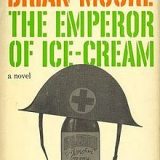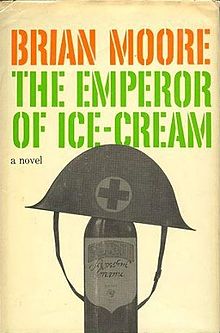The Emperor of Ice Cream – Brian Moore – 1965
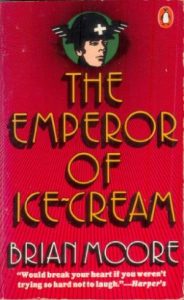
Reviewed by: Dave Date: 2 December 2002
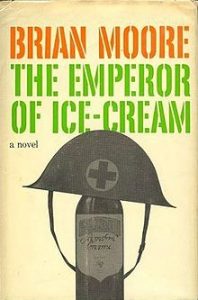 Not surprising for those familiar with Moore’s novels, he comes storming out of the gates with a lighthearted sort of tongue-in-cheek contempt for religion (specifically Roman Catholicism) right on the first page, where young Gavin Burke is having an imaginary dialogue with the icon of the Divine Infant that stands watch over him from its perch on his bedroom dresser. Gavin no longer believes in God, yet he remains in dread of God’s vengeance for the fact of this unbelief. He struggles with what he calls his Black Angel and White Angel which live, one on each shoulder. “The trouble was, the Black Angel seemed more intelligent; more his sort.” Comic dialogues with these invisible psychoanalysts abound in the novel.
Not surprising for those familiar with Moore’s novels, he comes storming out of the gates with a lighthearted sort of tongue-in-cheek contempt for religion (specifically Roman Catholicism) right on the first page, where young Gavin Burke is having an imaginary dialogue with the icon of the Divine Infant that stands watch over him from its perch on his bedroom dresser. Gavin no longer believes in God, yet he remains in dread of God’s vengeance for the fact of this unbelief. He struggles with what he calls his Black Angel and White Angel which live, one on each shoulder. “The trouble was, the Black Angel seemed more intelligent; more his sort.” Comic dialogues with these invisible psychoanalysts abound in the novel.
The scene is Belfast Ireland, early stages of WWII. Seventeen year old Gavin enlists in the war effort to escape the responsibility of continuing his education and getting “a real job.” This is a great spin on one of Moore’s oft-recurring themes… a young man struggling to make a go of it, and making wrongheaded decisions as he does so!
Gavin joins the A.R.P. (the First Aid Party, similar to a wartime emergency Red Cross). The boy has a totally negative self-image, and convinces himself that he is just “a second son that will never amount to anything.” He’ll never be as successful as his older brother Owen, and will never meet his father’s expectations of him.
So… he welcomes the War. As did many Ulster adults in that era, who oddly welcomed the advent of Hitler. They revelled in his havoc in Britain, and maintained the belief that the Fuhrer would never strike at their own little backwater towns anyway.
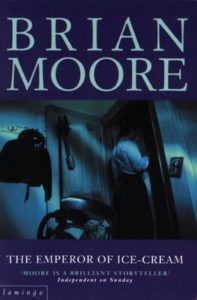 For Gavin, “War was freedom. Freedom from futures” (p.7). If there is a central sentence, this is it… it is a key theme in the novel. Believing those six words provided Gavin and many others with an excuse for not facing their personal problems. The ever-present, albeit unlikely, threat of attack provided distraction of all sorts.
For Gavin, “War was freedom. Freedom from futures” (p.7). If there is a central sentence, this is it… it is a key theme in the novel. Believing those six words provided Gavin and many others with an excuse for not facing their personal problems. The ever-present, albeit unlikely, threat of attack provided distraction of all sorts.
The central drama is within Gavin’s consciousness and in a bitter conflict between him and his father. Gavin’s adolescent fantasies of power and achievement – sometimes sexual, sometimes iconoclastic – always rest on a knife-edge of indecision and powerlessness, of shame and humiliation. But these fantasies, and his father’s equally self-serving political/philosophical beliefs are put to the test when the bombs fall.
It seems that Hitler has found Ireland on the map! This changes everything.
Father and son who have been bitter adversaries throughout the novel are reconciled through a shared knowledge of the horror of war. It proves to be more than either of them were ready for, and when they both return to their bombed-out house, they find that the war has changed a lot more than the physical landscape.
Those who know about Moore’s own upbringing will see that there is much autobiographical content in this novel.
A word about the title. It is borrowed from a Wallace Stevens poem. I looked it up in hopes of finding out why Moore chose this phrase as his title. The actual poem is very difficult, and far beyond the scope of this review to even half-examine. But what is certain is that it represents symbolically, the bitter moment of choosing life over death, at a time when life seems particularly lonely, self-serving, lustful, and sordid.
When I first picked up The Emperor of Ice-Cream I seriously thought it would be about a guy that sold ice-cream.
Moore proves once again that he is so much deeper than me…


